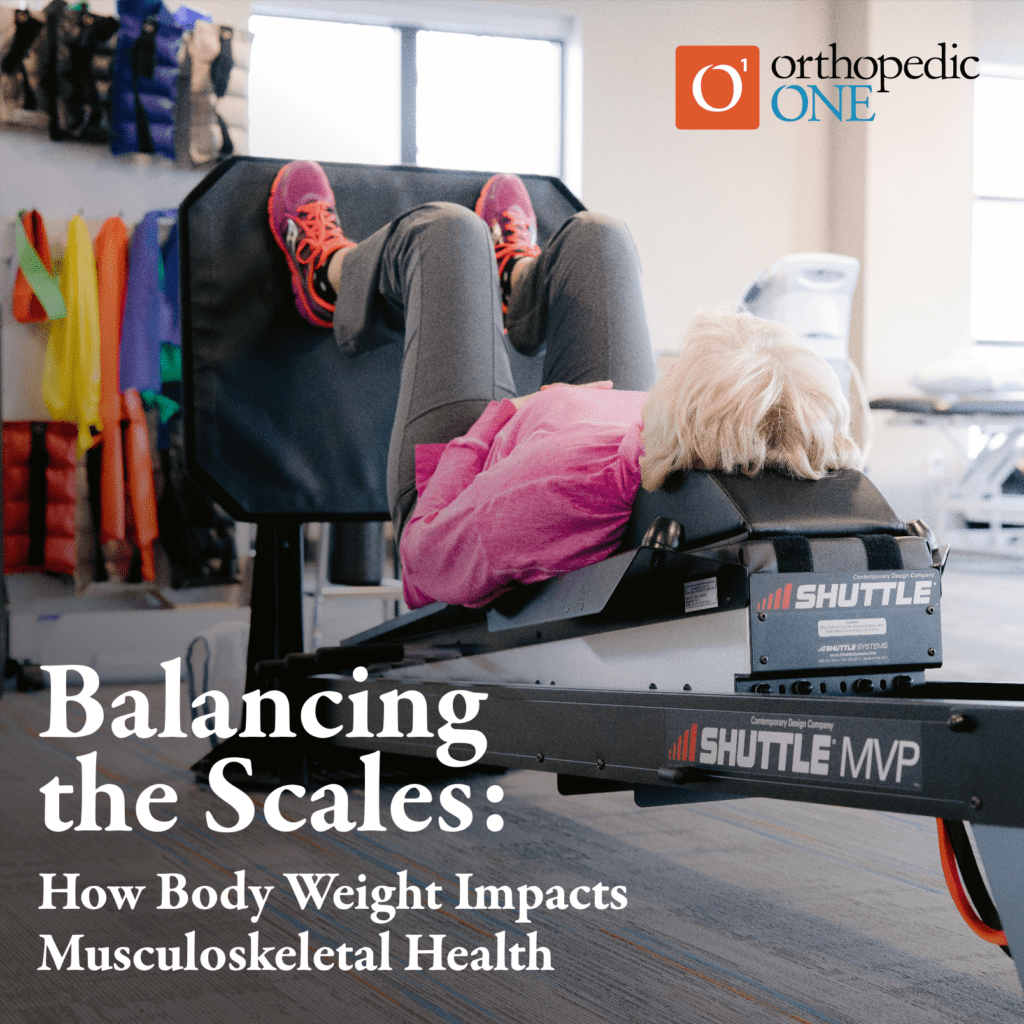BALANCING THE SCALES: HOW BODY WEIGHT IMPACTS MUSCULOSKELETAL HEALTH
With the beginning of the new year, many embark on a journey of self-improvement by making resolutions to enhance their health and wellness. Notably, weight loss is one of the most common resolutions, with nearly 35% of Americans putting it at the top of their list (Forbes).

Navigating the relationship between body weight and orthopedic health requires empathy and understanding. At Orthopedic ONE, we recognize that every individual’s experience with weight is unique and that everyone responds differently to diet and exercise. However, body weight is more than just numbers on a scale; it plays a significant role in our musculoskeletal health, shaping our mobility and quality of life. Body weight can impact your bones and joints, as well as your recoveries from orthopedic conditions and surgeries.
According to recent statistics, nearly 1 in 3 Americans are overweight, with more than 2 in 5 facing obesity. In Ohio alone, nearly 50% of adults are obese (Obesity Prevalence Map). The implications of these numbers extend beyond appearance—they directly correlate with increased risks of various diseases and health conditions.
For National Weight Loss Awareness Month, we’re shedding light on the intricate relationship between body weight and orthopedic health. Understanding the link between your body weight and your well-being is vital for promoting successful orthopedic outcomes and facilitating fast recoveries.
Weight and Your Joints: A Pounds-Pressure Connection
Every pound of body weight places between 4 and 6 pounds of pressure on the joints in your knees, hips, and feet. Consider how this impacts your musculoskeletal system if you are carrying excess weight. This added stress can exacerbate joint pain and lead to the accelerated wear and tear of joint tissues. Fortunately, the reverse is also true: even a pound of weight lost takes 4 to 6 pounds of pressure off of your joints!
Obesity frequently contributes to conditions such as soft tissue damage and osteoarthritis, making it imperative to address weight concerns in orthopedic care. Additionally, individuals with obesity may have more difficulties engaging in fitness activities due to increased joint stress, which can lead to conditions such as arthritis and plantar fasciitis. In fact, the Centers for Disease Control and Prevention (CDC) reports that nearly one-third of people with obesity have doctor-diagnosed arthritis, demonstrating a clear link between excess weight and joint health (CDC).
The Surgical Impact: Why Weight Matters in Orthopedic Procedures
For those considering or planning orthopedic surgery, body weight becomes a critical factor. Overweight and obese patients may experience more post-surgery pain, a higher rate of infection, and an increased likelihood of loosening or failure that may require correction in the future.
It’s not just about the surgery itself; it’s about optimizing conditions for a successful and sustainable recovery. A healthy weight decreases pressure on joints, potentially easing pain as well. Moreover, weight loss may reduce inflammation, decrease cartilage degeneration, and mitigate the overall severity of arthritis. Achieving a healthier weight before surgery is not simply a cosmetic concern; it can significantly improve surgical outcomes and hasten recovery.
Striving for Orthopedic Wellness: The Role of a Healthy Weight
At Orthopedic ONE, we encourage a proactive approach to weight management. Maintaining a healthy weight not only facilitates better orthopedic outcomes but also helps to prevent future complications, such as chronic pain and musculoskeletal injuries.
As you embark on your journey to better health, consider these key takeaways:
- Awareness is essential: Understanding the relationship between body weight and orthopedic health is the first step toward making informed decisions about your well-being.
- Proactive management: No matter your weight, implementing healthy lifestyle changes can help to promote better musculoskeletal wellness. Our Orthopedic ONE providers, in partnership with your primary care providers, can offer guidance and resources, supporting you every step of the way.
- Incorporate movement: Engage in physical activities that are appropriate for your fitness level, taking into account the impact on your joints. Try experimenting with lower impact activities, such as walking, swimming, or yoga. Strive to establish a routine that promotes both cardiovascular health and musculoskeletal wellness.
- Partner with orthopedic experts: If you’re facing orthopedic challenges or considering surgery, collaborate with our experienced specialists at Orthopedic ONE. We will work with you, and your entire care team, to identify strategies to optimize your orthopedic health.
By understanding the impact of weight on your joints, health, and surgery outcomes, you can take active steps toward managing your weight effectively. No matter where you are in your journey, making even small changes in the right direction can have significant results. Research shows that patients who lose just 5% of their total body weight can lower their blood pressure, reduce inflammation, and improve their joint strength (NBC News).